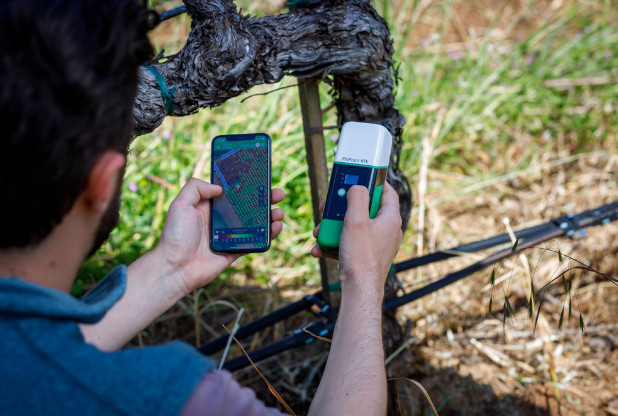
VineView launches precision GPS for vineyard management
VineView has introduced the PinPoint RTK, a GPS receiver designed to provide vineyard operators with highly accurate data collection capabilities. The PinPoint RTK uses Real-Time Kinematic (RTK) technology to offer accuracy within 2-5cm, significantly more precise than traditional GPS receivers, which typically have an accuracy of 2-4 metres.
Released today in Napa, California, the device aims to assist vineyard managers in collecting detailed spatial data, allowing them to create precise maps. These maps can be used for various tasks such as tracking production, mapping disease outbreaks, estimating yields and managing assets. For instance, vineyard managers could plan the purchase of rootstocks, monitor disease progression to decide when to remove a field or send employees to exact locations for replanting, using the technology.
The device is portable, durable and water-resistant and features three programmable buttons, enabling users to log specific data points. It is also compatible with Android and iOS, to ensure accurate note-taking and data tracking, including areas without a data connection.
- Read more: Imbibe Live to become BCB London next year
Richard van der Put, CEO of VineView said: “VineView’s PinPoint RTK is a great addition to our mobile data platform and makes it extremely easy for vineyard managers to affordably track field observations digitally. Imagine replacing written notes with geo-located tags at the individual vine level.”
The new product launch follows a wider trend of businesses integrating AI and GPS technologies into winemaking. Naïo Technologies, based near Toulouse, leads with its robot Ted, a battery-powered cultivator guided by GPS. Ted efficiently weeds vineyards, replacing chemical herbicides banned in France. Its precise operation preserves vines while enhancing sustainability. Naïo has since expanded to California and Canada.
Meanwhile, established firms like John Deere and Kubota, alongside AI startups in the US, Italy and France, are advancing agricultural robotics. In Spain, robots harvest strawberries, showcasing AI’s capability in crop harvesting. These technologies promise increased efficiency and sustainability, crucial amid labour shortages and environmental challenges.
In essence, AI and GPS technologies enable devices like Ted and VineView’s PinPoint RTK to perform repetitive tasks with precision and reliability, reducing reliance on manual labour and harmful chemicals. This trend reflects a shift towards autonomous agriculture, where machines equipped with AI and GPS handle tasks traditionally done by farmers. As these technologies evolve, they aim to improve vineyard operations globally, from pruning to harvesting, potentially ushering in a new era of viticulture.





